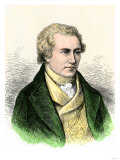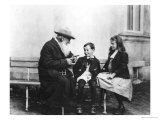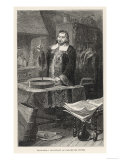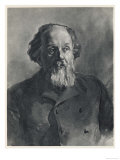|
|
|

Mary Burnet Talbert
|
Mary Burnett Talbert
b. 9-17-1866; Oberlin, OH
d. 10-15-1923
Orator, activist, suffragist and reformer Mary Burnett Talbert, called “the best known Colored Woman in the United States,” was among the most prominent African Americans of her time.
Upon graduating from Oberlin College she became the assistant principal of Union H.S. in Little Rock, AR, and after marriage moved to Buffalo, NY, where her civil rights activities lead her to becoming one of the founders of the Niagara Movement.
|
|
|
|
Ida Minerva Tarbell
b. 11-5-1857; Erie Co., Pennsylvania
d. 1-6-1944; Bridgeport, CT
Ida Tarbell, known as one of the leading “muckrakers”, or investigative journalist, of her day, is best-known for her 1904 book The History of the Standard Oil Company. She also wrote magazine series and biographies, and was a school teacher.
Ida Tarbell quotes ~
• “How defeated and restless the child that is not doing something in which it sees a purpose, a meaning! It is by its self-directed activity that the child, as years pass, finds its work, the thing it wants to do and for which it finally is willing to deny itself pleasure, ease, even sleep and comfort.”
• “Perhaps our national ambition to standardize ourselves has behind it the notion that democracy means standardization. But standardization is the surest way to destroy the initiative, to benumb the creative impulse above all else essential to the vitality and growth of democratic ideals.”
• “Imagination is the only key to the future. Without it none exists – with it all things are possible.”
• “Rockefeller and his associates did not build the Standard Oil Co. in the board rooms of Wall Street banks. They fought their way to control by rebate and drawback, bribe and blackmail, espionage and price cutting, by ruthless ... efficiency of organization.”
|
|
|
|
|
|
|
Alma Woodsey Thomas
b. 9-22-1891; Columbus, Georgia
d. 2-24-1978; Washington, DC
Artist Alma Woodsey Thomas was the first graduate of Howard University’s newly organized art department (1924). In 1972 she became the first African American woman to hold a solo exhibition at the Whitney Museum of American Art.
She was also a noted teacher, starting a community arts program that encouraged student appreciation of fine art.
Alma Woodsey Thomas quote ~
• “Creative art is for all time and is therefore independent of time. It is of all ages, of every land, and if by this we mean the creative spirit in man which produces a picture or a statue is common to the whole civilized world, independent of age, race and nationality; the statement may stand unchallenged.”
|
|
|
|
Benjamin Thompson, Count Rumford
b. 3-26-1753; Woburn, Massachusetts
d. 8-21-1814; Paris
Before physicist and inventor Benjamin Thompson became Count Rumford he was a schoolmaster in Concord, New Hampshire.
Thompson was also part of two revolutions - he challenged established physical theory in thermodynamics and was a Loyalist Colonel in the American Revolution. Thompson moved on to London after the war, steadily moving up the scientific and social European ladders. He was knighted by King George III, and eventually made a Count of the Holy Roman Empire. His name was so recognizable that Jane Austen mentions the Rumford fireplace in Northanger Abbey.
Several inventions bear his name - the Rumford fireplace which increased comfort and efficiency heating a home, and Rumsford's Soup, concocted as the cheapest possible ration that was still a high-calorie, nutritious food for the poor and prisoners. A crater on the Moon is also named after him as is a baking powder that was patented in 1859.
• The Forgotten Art of Building a Good Fireplace
|
|
|
|
|
|
|
Leo Tolstoy
b. 9-9-1828; Yasnaya Polyana, Russian Empire
d. 11-20-1910; Astapovo, Russian Empire
Leo Tolstoy, best remembered as the author of War and Peace and Anna Karenina, was also an educational reformer, founding schools for the serfs on the family estate.
Tolstoy was also a “teacher” of Gandhi who called Tolstoy “the greatest apostle of non-violence that the present age has produced”.
|
|
Leo Tolstoy quotes ~
• “School is established, not in order that it should be convenient for the children to study, but that teachers should be able to teach in comfort. The children’s conversations, motion, merriment are not convenient for the teacher, and so in the schools, which are built on the plan of prisons, ... are prohibited.”
• “Everyone thinks of changing the world, but no one thinks of changing himself.”
• “All, everything that I understand, I understand only because I love.”
• “A man can live and be healthy without killing animals for food; therefore, if he eats meat, he participates in taking animal life merely for the sake of his appetite.”
• “Art is not a handicraft, it is the transmission of feeling the artist has experienced.”
• Great Short Works of Leo Tolstoy
|
|
|
|
Evangelista Torricelli
b. 10-15-1608; Faenza, Romagna (present-day Italy)
d. 10-25-1647: Florence
Torricelli was a mathematician and physicist most noted for inventing the Barometer (1642) and for stating Torricelli's Law concerning the speed of a fluid flowing out of an opening, later shown to be a particular case of Bernoulli's principle.
He succeeded Galileo as the grand-ducal mathematician and professor of mathematics in the University of Pisa.
• weather posters
|
|
|
|
Konstantin Tsiolkovsky
b. 9-17-1857; Izhevskoye, Russian Empire
d. 9-19-1935
Math teacher Konstantin Eduardovich Tsiolkovsky is today considered the “father of space travel”. Self taught, Tsiolkovsky had been denied entry to elementary school because of deafness that was caused by a childhood illness. His thesis,“The Exploration of Cosmic Space by Means of Reaction Devices”, was published in 1903; he also wrote extensively on space and related subjects, including science fiction novels.
The television series, Star Trek: The Next Generation honored him by naming a fictional space ship the K. E. Tsiolkovsky.
|
|
|













